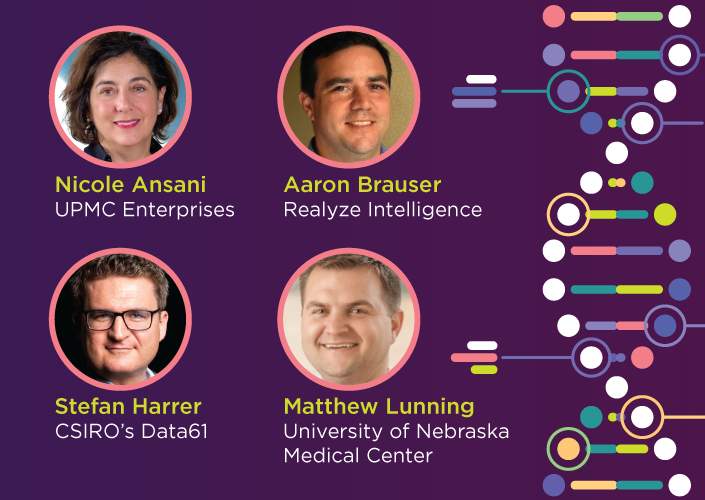CCM leads discussion with experts from UPMC and Emory University during HDM KLASroom program on the clinician and care team experience
Artificial intelligence (AI) was identified as the most exciting emerging technology in health care in each of the past two “Top of Mind for Top Health Systems” research reports published by the Center for Connected Medicine (CCM).
The technology is often heralded for its potential to improve patient care, reduce the administrative burden on physicians, and bring greater efficiencies to hospital operations. But despite this potential, adoption across health care has been limited.
While there are myriad reasons for slow adoption, the Top of Mind research identified a lack of trust and buy-in, especially by physicians, as the biggest challenge facing AI in health care.
So where has AI been successfully implemented in health care?
Alex Nixon, Senior Research Analyst at the CCM, discussed this topic with Dr. Judy Gichoya, Assistant Professor in the Department of Radiology at Emory University School of Medicine and an NIH Data Scholar at Fogarty International Center at the National Institutes of Health, and Dr. Oscar Marroquin, Chief Healthcare Data and Analytics Officer at UPMC, during an HDM KLASroom program on the clinician and care team experience.
The CCM-led session, “A Matter of Trust: AI and the Clinician Experience,” addressed this critical area for health care technology leaders to consider if AI is to have a meaningful impact on the industry.
Use cases for AI in health care
AI has been effective in helping emergency department clinicians better assess patients who come in with complaints of chest pain. While imaging technology such as Coronary Computed Tomography Angiography (CCTA) can reduce the need for cardiac catherization, the images don’t always provide a definitive answer about the need for more invasive procedures.
“So how are you going to make this type of image acceptable so that people are confident that the patient’s vessels are actually clean?” Dr. Gichoya said during the HDM KLASroom program, a four-episode program running each Wednesday in April 2022.
AI can help with image processing and reconstruction and provide a more accurate picture of what is happening inside a patient with chest pain, Dr. Gichoya said. And this increased accuracy can lead to fewer unnecessary procedures and shorter times in the emergency department.
Dr. Marroquin, who trained as a cardiologist, agreed with Dr. Gichoya’s comments and added that AI is also becoming essential for generating insights based on the tremendous amounts of data within health systems. These AI-derived insights can lead to better patient care.
“It’s impossible to consume all that information, and then synthesize it and come out with the insights that are needed in order to make the right decisions,” Dr. Marroquin said.
“Whether it’s all the computational power and algorithms behind the scenes to make a coronary CTA readable and understandable, or whether at a macro level understanding all the dynamics in a multi-hospital system so we more efficiently deploy our resources to make sure that we efficiently use our ORs or our cath labs or radiology suites,” he said. “We need to adapt ourselves to a world where we have the technology that enables us to be better care providers.”
View the on-demand replay of “A Matter of Trust” and the rest of the HDM KLASroom program from Health Data Management and KLAS Research.
More on AI from the CCM
Executive Outlook: Artificial Intelligence in Health Care
Infographic: Artificial Intelligence generating excitement amongst health system leaders
Expert Panel Discussion on the Intersection of Value and Artificial Intelligence
White Paper: Machine Learning and Structural Bias in Health Care
Expert Panel Discussion: There is tremendous potential for AI to impact health care



